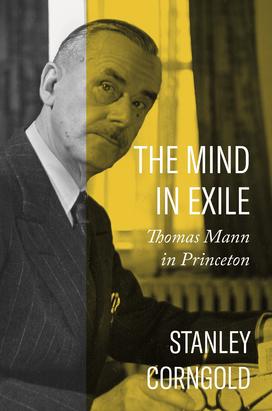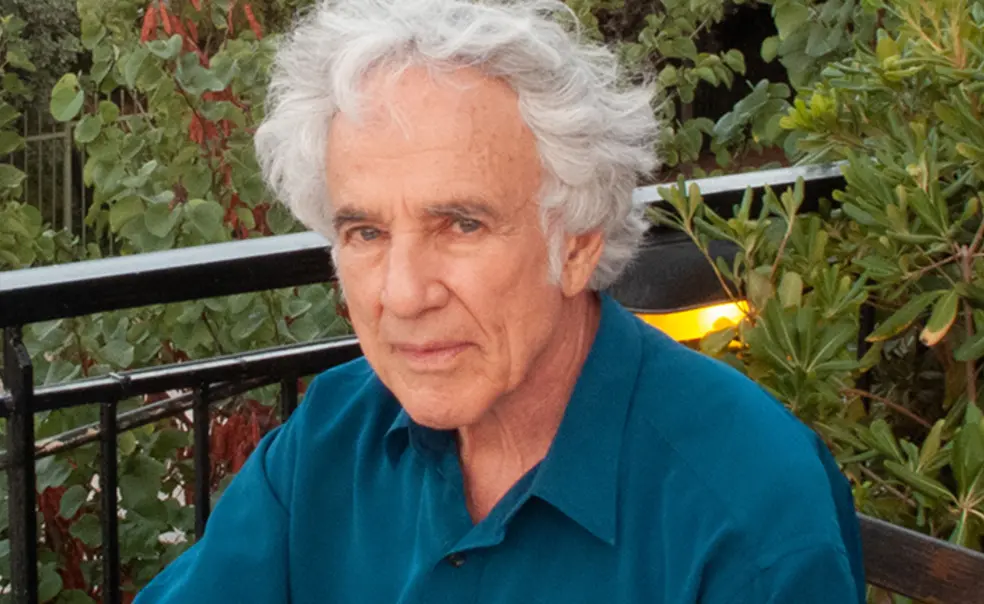New Book Details Thomas Mann’s Time at Princeton
Mann’s time at Princeton left a permanent mark on his work

“Why does it matter?” she asked.
“It matters damnably,” he snapped. “His life is not safe in Switzerland. The Nazis will murder him — stage an automobile accident or send over some poisoned food.”
This was the start of conversations that led to Mann joining Princeton as an “honorary professor,” for two and a half years, from Sept. 1938 to March 1941. These years are the subject of Stanley Corngold’s two new books, The Mind in Exile: Thomas Mann in Princeton (Princeton University Press) and Weimar in Princeton: Thomas Mann and the Kahler Circle (Bloomsbury). There, Corngold, an emeritus professor of German and comparative literature at the University, explores the influence that Princeton’s campus and community had on Mann’s work — and the influence that Mann had on Princeton.
Before his arrival at Princeton, Mann was perhaps the most famous living writer in the world. The author of The Magic Mountain, Death in Venice, and Buddenbrooks, among other works of fiction, he had received the Nobel Prize in Literature in 1929. As his German cultural inheritance was the core of his artistic identity, he was a meaningful figure in the fight against Nazism and proof that a patriotic German could be an enemy of Hitler. With a refuge so close to Axis Europe, he was certainly in danger of assassination. Hitler’s spies hunted the Reich’s opponents using poison, bombs, knives, and sniper bullets. (Rumors went even further — saying, for instance, that German fighter pilots were flying close to passenger planes, peeping in the windows to see if they recognized some famous enemy they should shoot.)
As it happened, Caroline Newton was Mann’s friend. So was Agnes Meyer, the wife of the chairman of The Washington Post, who likewise had connections to the University. It was these women who conspired with Princeton’s administration to find Mann a role. His years in Princeton would be anni mirabiles, a time of remarkable thought and productivity that would help to define his whole career.
What does it take for a place, or a community, to become a wellspring of creativity? The sociologist Randall Collins argues that friendship is as potent an ingredient as thought. In Princeton, Mann moved into a community that historians now call “the Kahler Circle.” Its members included the literary scholar Erich Kahler and his wife, Alice; the philosopher Hermann Broch; the archaeologist Hetty Goldman, the first woman to take a faculty position at the Institute for Advanced Study; the art historian Erwin Panofsky; the mathematician Kurt Gödel; and Albert Einstein and his wife, Elsa. They had dinner together, went for walks around campus, argued about politics, and read aloud to each other in the evenings. (Mann read aloud from his works in progress, like the novel Lotte in Weimar.)
Many of the Circle’s members were refugees, like Mann. Kahler, a German Jew, had been Mann’s friend in Germany; when Mann heard, in 1938, that Kahler might leave Germany for the United States, he wrote to Kahler with praises of Princeton, insisting that Kahler join him there: “The happiest news I gathered was your growing resolution to come over here. Do so! What’s the sense of staying now? And how fine it would be to live as neighbors… The people are well meaning through and through, filled with what seems to me an unshakable affability. You would breathe easier among them, would be touched and happy. The landscape is park-like, well suited to walks, with amazingly beautiful trees which now, in Indian summer, glow in the most magnificent colors.”
Mann’s time with the Kahler Circle, as historians call it today, transformed his political outlook, Corngold says in the book. His position as an honorary professor required him to lead precepts and write public lectures to deliver at the University. He initially intended to spend most of his unscheduled time working on novels. But he found himself consumed by the era’s moral and political emergencies, and by the obligation to speak to those emergencies in the present-tense language of fact. He discussed politics with his Princeton friends, wrote up his ideas in impassioned addresses, and traveled across the United States delivering them to huge crowds. In the process, Corngold says, Mann changed “from arch European conservative to liberal conservative to ardent presenter of democratic socialist ideals.”
Mann didn’t like to think of himself as an exile, even though Germany revoked his citizenship in 1936. When he arrived in the United States in 1938, he told a journalist, “Where I am, there is Germany. I carry my German culture in me.” Others in the Kahler Circle were less resistant to the title refugee, but they shared with Mann an abiding love of German literature and learning. Mann reportedly gave Einstein a copy of The Castle, a novel by Franz Kafka, a Czech Jew who wrote in German. The Kahler Circle regarded Kafka as one of the finest modern representatives of German literature.
When he gave talks in the United States, Mann emphasized his claim to the German spirit. (“As things stand today,” he said in a 1945 speech at the Library of Congress, “my type of Germanism is most suitably at home in the hospitable Panopolis, the racial and national universe called America.”) Over time, he shifted towards a firm liberal humanism while stressing, always, that a more understanding, more united world might yet emerge from the war; his friends in Princeton, Kahler especially, influenced the development of his political thought. During the war, the U.S. Air Force printed up Mann’s speeches as leaflets and dropped them over German towns.
As an essayist, polemicist, and conversationalist, he borrowed rhetorical flourishes from his teaching role at Princeton, often writing “in the manner of a schoolmaster,” Corngold says. His friends nicknamed him “Praeceptor Germaniae” (Latin for German teacher) for what one friend, the émigré Austrian writer Ernst Lothar, called his “schoolmaster’s delight in precepting,” which Mann carried from the classroom to the dinner table. One point in particular he would punctuate with the Latin phrase “non datur” — short for tertium non datur, “You have no other option.” The point was that every artist whose cultural inheritance included the German language had to use the arts of that language to fight, as Lothar recalled: “We too were obliged to serve, and this — it was his expression — would be our ‘wartime service’; we too had to fight a war against Hitler with the weapon of the German word, which did not by any means have to be polemical but instead must hold fast to what had to be preserved.”
On campus, Mann was a celebrity, Corngold writes. When he checked out books in the library, students would crowd around to see what titles he was reading. The reason, it turned out, was because when you checked out a book, you had to sign a little card inside that book, so students would track down the same titles later and take out the cards, which now bore Mann’s autograph. Mann’s wife, Katia, supposedly said, “Tommy, you are cheapening the value of your signature!” After that, the story goes, the Manns found a third party to check out books for him.
Princeton has a tradition of fostering creative coteries, and Mann gained a great deal from his time with the Kahler Circle, Corngold says in an interview.
“He was deeply stimulated by his conversations with friends and visitors,” Corngold says. “Mann and Kahler met frequently, and every evening turned into political conversation, cultural conversation, or a reading of Mann’s latest work.”
Eventually, Mann left the East Coast for Los Angeles. But his time at Princeton left a permanent mark on his work, making him more political, more professorial, more defiantly German, and thoughtfully, gratefully American. As he watched the storms in Europe intensify, he wrote in his journal, “It will be a good thing to follow — and await — the unforeseeable development of the war, its vicissitudes and terrors, in my Princeton library.”












3 Responses
Frank Hurley *65
3 Years AgoMann’s Transformation
The May 2022 Princeton Alumni Weekly article on the celebrated German author Thomas Mann was quite interesting.
It was noted that Mann, at Princeton, changed “from arch European conservative to liberal conservative to ardent presenter of democratic socialist ideals.” In fact, he became a spokesman for the political opponents of the House Un-American Activities Committee and its “witch hunts.” (They netted quite a few witches by the way.) As he left America to live out the rest of his life in Switzerland, Mann, as his Parthian shot, odiously equivalenced the government of the United States to that of Nazi Germany.
So there would seem to be two possibilities. Either (1) Thomas Mann was a red from the word go, and deployed a curtain of anti-Nazi, pro-democrat sentiment to conceal that fact for some years, or (2) as soon as he hit Princeton, it was intellectually downhill in a hurry.
I’m handicapping that one as even money.
Norman Ravitch *62
3 Years AgoMann and the First World War
Permit me to say first that I have read Mann in English and in German — in German when I studied German and before I began to find German prose more and more difficult.
I personally, on rereading Mann, like him less and less, and this has nothing to do with the German language. Once a fan of The Magic Mountain I reread it recently and found it dull and uninspiring, but with value.
But what I really want to say is this: In 1914 Mann and the majority of German intellectuals, professors, and cultured elites believed Germany had been less than well respected in the West and had every right to seek more European territory. They supported the German war effort for the duration of the war; this included famous scientists and even Sigmund Freud.
Scott Abbott *79
3 Years AgoMistaken History
My first publication as a scholar of German literature detailed my discovery of the source for the Freemasonic conversations in The Magic Mountain. I had the pleasure of lecturing on the subject in the house Mann occupied while in Princeton. The Magic Mountain is an intricate, sexy, and brilliant work that ends ominously with Hans Castorp on a battlefield during the first World War. Mann’s lecture at Princeton about the novel is a humble and revealing document. Corngold discusses in great detail Mann’s explanation and remorse for his position on World War I. Mann’s error had nothing to do with the desire to acquire new territory but was a statement of problematic values that developed quickly into his staunch advocacy for democracy and international cooperation in opposition to the absolutist National Socialist state. Remorse and admission of error are, for me, marks of a decent human being. Furthermore, it is quite untrue that Sigmund Freud supported the war throughout its “duration”: consult his paper “The Disillusionment of the War,” written in 1915.